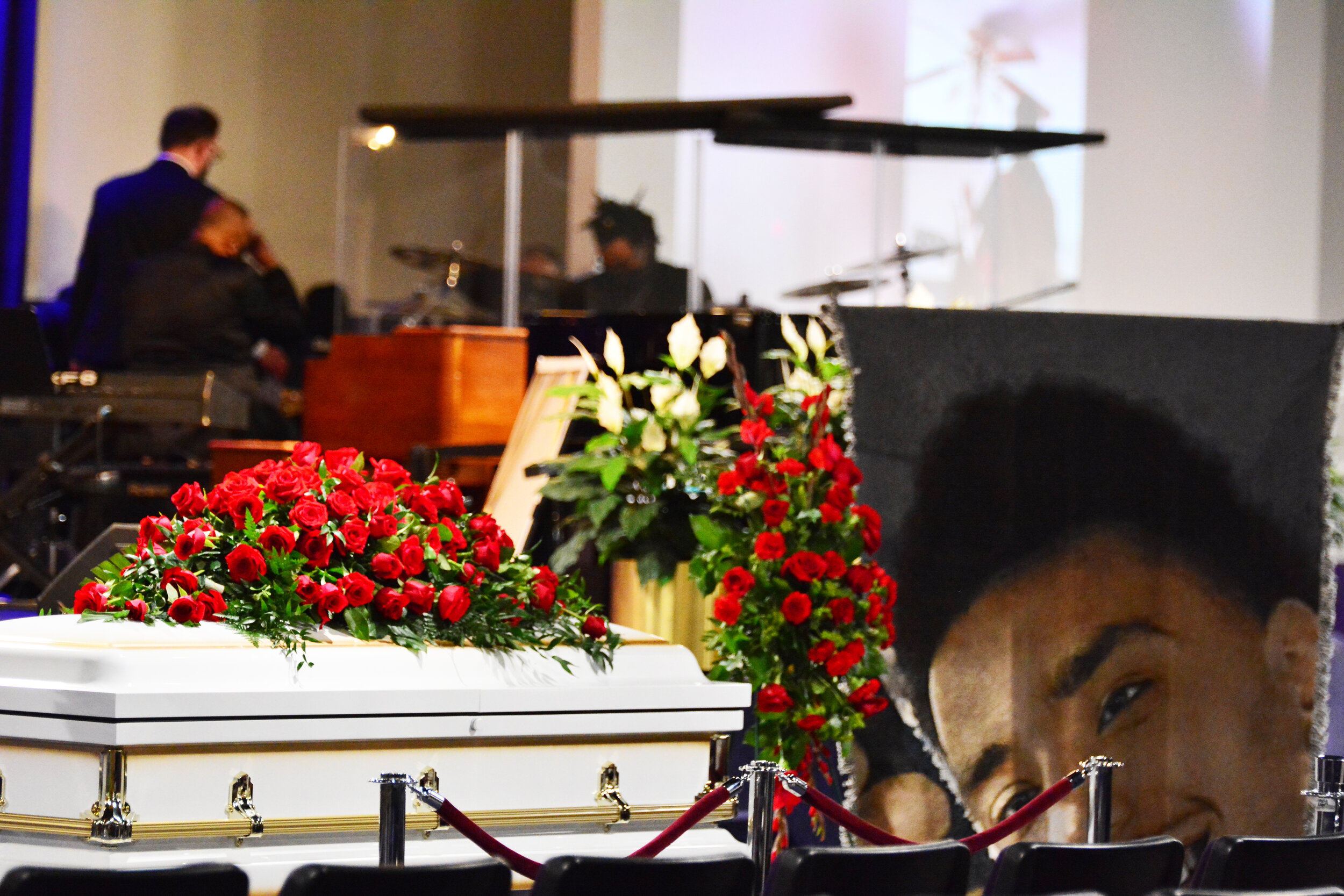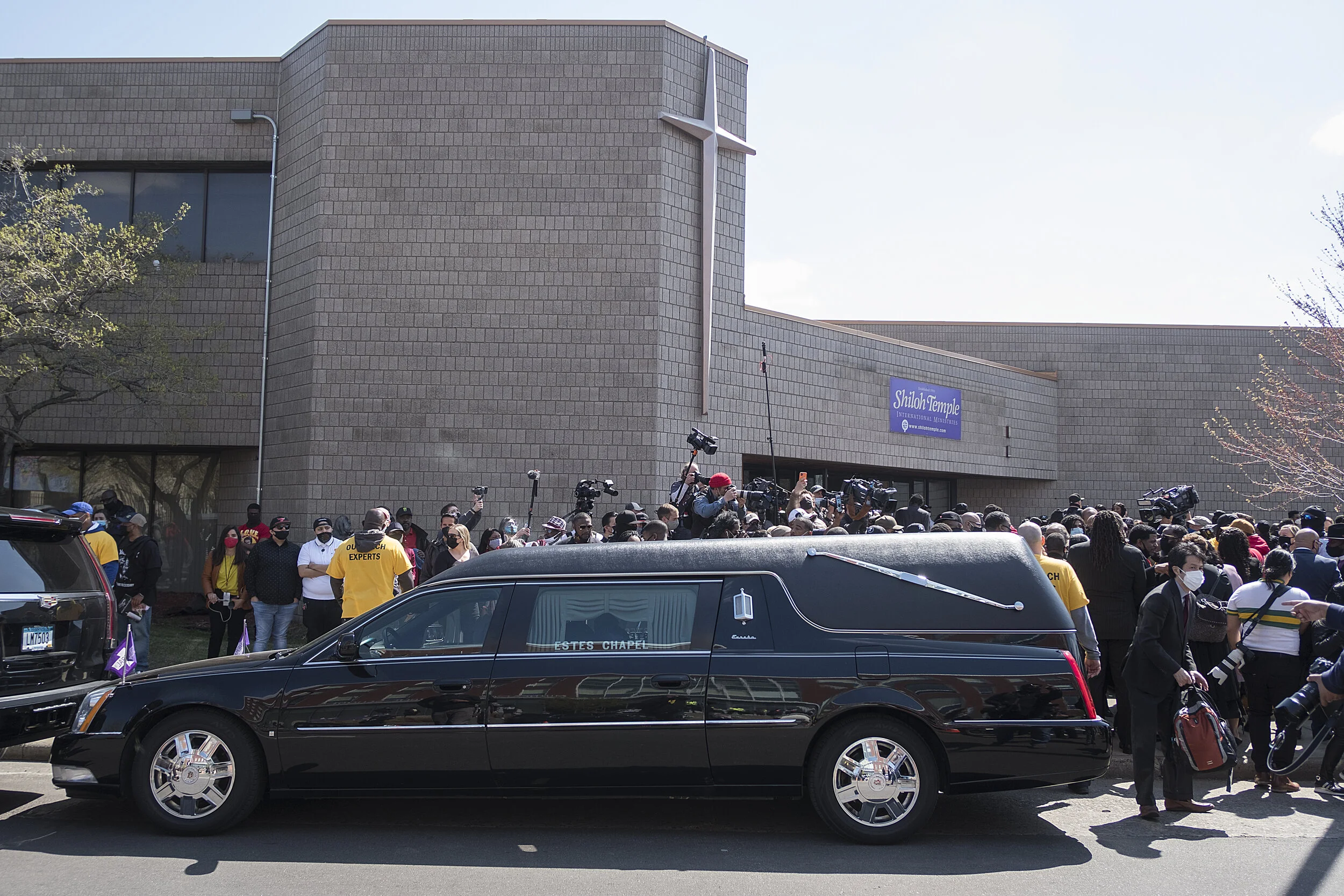A ‘prince’ was laid to rest
Daunte Wright remembered as a shining light, loving father
By Harry Colbert, Jr., editor-in-chief
The day after the fifth anniversary of Prince’s death another prince was laid to rest.
Twenty-year-old Daunte Wright was laid to rest on April 22. Photo by Harry Colbert, Jr.
Like the musical legend who changed the world, so too was 20-year-old Daunte Wright. Mourners by the hundreds packed into Shiloh Temple International Ministries on West Broadway Avenue to remember the man gunned down April 11 by a single bullet from a Brooklyn Center police officer. Inside and outside throngs of media – some from as far away as France and the UK – were on hand to report on the homegoing. The spectacle was both notable and according to many, necessary.
“As I was making my way into the service to pay respects to young Daunte a person in a car drove past and said, ‘I haven’t seen a funeral like this since Prince’s funeral. I told the man, that today we came to bury a prince … the Prince of Brooklyn Center,” said the Rev. Al Sharpton, who delivered Wright’s eulogy. “You thought he was a kid with air freshener … no, he was a prince.”
The Rev. Al Sharpton walks into Shiloh Temple with Daunte’s mother, Katie Wright. Photo by David Pierini
A reason for Wright’s police encounter was that he had an air freshener hanging from his rearview mirror and expired license plate tags.
“You pulled Daunte over for air freshener. Well now we are the air freshener. We’ve come to get out the stench of police brutality and racism out the air,” said Sharpton.
Wright was Black. The officer who shot Wright, 26-year veteran Kim Potter, is white. Potter said she mistook her Glock pistol for a taser. According to the Harvard University School of Public Health, Blacks in America are 3.23 times more likely to die at the hands of police than whites.
“If Kim Potter would have seen Daunte like she would have seen her own son she would not have shot him. She would not have even attempted to taser him,” said civil rights attorney Benjamin Crump. Crump is the attorney representing the Wright family and the attorney who represented the family of George Floyd. Floyd’s murderer, Derek Chauvin was convicted on April 20 of second-degree murder for the knee to the neck and chest that extinguished the life of Floyd on May 25, 2020.
“For Black people, too often traffic stops end in death sentences,” Crump told the near overflow crowd. “We’ve got to keep up the fight for our children. We’ve got to fight until hell freezes over. And then we need to be prepared to fight on the ice.”
Katie Wright, the mother of Daunte Wright, said her son was the light of her life and brightened up any room he walked into. She said burying her son is a burden she shouldn’t have to bear.
“The roles should be reversed. I shouldn’t be up here to bury my son, he should have buried me,” said Katie Wright.
A hearse waits outside Shiloh Temple International Ministries to transport the casket carrying Daunte Wright to his final resting space. Photo by David Pierini
Daunte Wright’s father Arbuey Wright, too overcome with emotion, was only able to say, “That was my son.”
Countless dignitaries were on hand to pay tribute to young Daunte Wright. Gov. Tim Walz told the mourners that he ordered a two-minute moment of silence throughout the state in honor of Daunte Wright. Rep. Ilhan Omar presented Daunte Wright’s parents with an American flag that flew at half-mast over the U.S. Capitol in honor of the slain 20-year-old.
Also in attendance were families ravaged by police (or pseudo police) violence. They included Valarie Castile, the mother of Philando Castile, killed by a Falcon Heights police officer during a traffic stop, the family of George Floyd, the mother of Oscar Grant, Grant, who was killed in Oakland by an officer who, similar to Daunte Wright, claimed to have mistook a gun for a taser, the family of Emmitt Till, the 14-year-old civil rights martyr killed in 1954 by a white lynch mob in Money, Miss. for supposedly whistling at a white woman and the family of Jamar Clark, 24, killed in 2015 by Minneapolis police.
Wright’s casket led a procession outside Shiloh Temple after the service. Photo by David Pierini
Sharpton, Crump, Omar and Sen. Amy Klobuchar all called on the Senate to pass the George Floyd Justice in Policing Act. If passed, the act would set federal standards for policing by lowering the criminal intent standard from willful to knowing or reckless to convict a law enforcement officer for misconduct in a federal prosecution, limits qualified immunity as a defense to liability in a private civil action against a law enforcement officer or state correctional officer, and authorizes the Department of Justice to issue subpoenas in investigations of police departments for a pattern or practice of discrimination.




